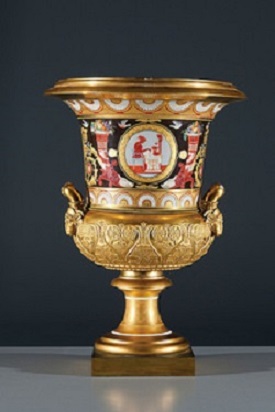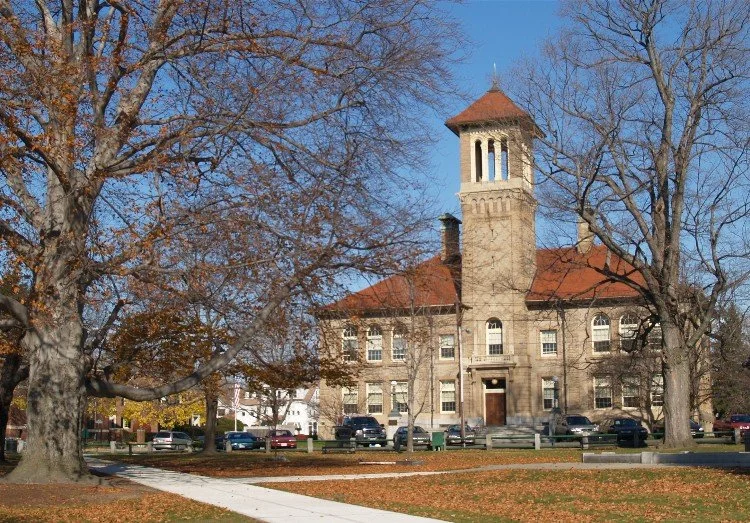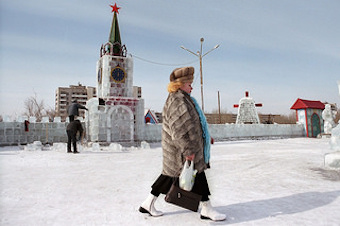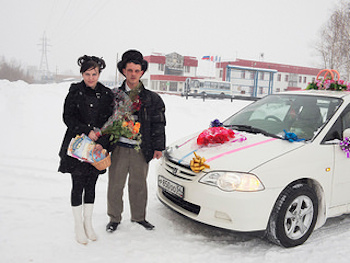‘Ammo boxes into icons’
“Icon of the Archangel Michael,’’ by Sofia Atlantova, at the Museum of Russian Icons, Clinton, Mass., in the show “Artists for Ukraine: Transforming Ammo Boxes into Icons,’’ through Feb. 13 Painting on loan from Catherine Mannick.
The museum explains that the show presents three Ukrainian icons painted on the boards of ammunition boxes by Oleksandr Klymenko and Sofia Atlantova, a husband-wife artistic team from Kyiv, the capital of Ukraine.
“The project ‘Buy an Icon—Save a Life’ was developed in response to the 2014 Russian invasion of Ukraine, when Klymenko encountered empty wooden ammunition boxes from combat zones and noted their resemblance to icon boards (doski). By repurposing the panels, the project strives, in the artist’s words, ‘to transform death (symbolized by ammo boxes) into life (traditionally symbolized by icons in Ukrainian culture). The goal, this victory of life over death, happens not only on the figurative and symbolic level but also in reality through these icons on ammo boxes.’
“Exhibitions of the ammo box icons have been staged throughout Europe and North America to raise awareness of the ongoing war in Ukraine. In addition, sales have provided substantial funds to support the Pirogov First Volunteer Mobile Hospital, the largest nongovernmental undertaking to provide medical assistance to the Donbas region. The Russian invasion of Ukraine in February 2022 strengthened the resolve of Atlantova and Klymenko to continue painting icons on boards taken back from the frontlines. To date, the project has raised more than $300,000.’’
The Clinton Town Hall was built in 1909. Designed by Peabody and Stearns, it replaced the previous Town Hall, built in 1871-1872, destroyed by fire in 1907. Even fairly small New England towns often built impressive town halls in the late 19th and early 20th centuries out of civic pride.
Ballet Russes in Clinton
“Tamara Karsivina as Columbine in Le Carnaval, ‘‘1912, (platinum palladium print ©Curatorial Assistance Inc. / E.O. Hoppé Collection), by Emil Hoppé, in the show “Emil Hoppé: Photographs from the Ballet Russes,’’ at the Museum of Russian Icons, Clinton, Mass., through March 8.
The museum says: The exhibition “pays homage to the genius of two men: famed Russian impresario Sergei Diaghilev, who founded the Ballets Russes; and renowned photographer Emil Otto Hoppé, who photographed the champions of that illustrious company.’’
In Clinton, Mass., the Wachusett Reservoir, the second-largest body of fresh water in the Bay State.
Fuller Field, in Clinton, is said to be the oldest ballpark in continuous use, since 1878.
The Foster Fountain in Clinton’s Central Park. As with many New England mill towns that flourished in the 19th Century, Clinton has a lovely public park.
This from the town:
“Central Park was established in 1852 when the land was donated to the town by Horatio N. Bigelow. The four-acre lot contains two war monuments, one for Clinton residents who served in the Spanish-American War, and the other a Civil War monument. A sundial can also be found on the south side of the park, and the ‘Foster Fountain’ on the north side of the park. The Foster Fountain was given to the town by John R. Foster in 1890 and later was destroyed in the hurricane of 1938. A replica fountain was fabricated from the original Fiske Iron Works patterns and re-dedicated by the Town of Clinton on September 9, 2000.’’
'Migration + Memory'
From the show "Migration + Memory: Jewish Artists of the Soviet and Russian Empires,'' through Jan. 28, at the Museum of Russian Icons, Clinton, Mass.
Frozen polls
Photo in Krasnoskamensk, Russia, March 2006, by SERGEY MAXIMISHIN, in the show "Siberia Imagined and Reimagined,'' at the Museum of Russian Icons, Clinton, Mass., through Jan. 10.
News stories frequently report that Russian President Vladimir Putin has about an 80 percent approval rating in polls. But what do public-opinion polls means in a police state?
Putin has big plans for it
From the show "Russian Photography: Siberia Imagined and Reimagined,'' at the Museum of Russian Icons, Clinton, Mass., through Jan. 10.
The museum explains that the show "brings {new} photographs of Siberia by Russian photographers to the American public for the first time. Countless images of Siberia by non-Russian photographers have been published and those depictions have shaped perceptions around the world. 'Siberia Imagined and Reimagined' offers an insider’s view.''
No Gulag pictures in this show!
Cole Porter, in his musical "Silk Stockings,'' had a song called "Siberia,'' in which one of the lines was that in Siberia, "you never have to send out for ice.''
Moment of truth for the West
 At the Museum of Russian Icons, in Clinton, Mass., in the show "The Tsars' Cabinet,'' which highlights 200 years of decorative arts under the Romanov dynasty. Russian oligarchs around Vladimir Putin also love to collect these items.
At the Museum of Russian Icons, in Clinton, Mass., in the show "The Tsars' Cabinet,'' which highlights 200 years of decorative arts under the Romanov dynasty. Russian oligarchs around Vladimir Putin also love to collect these items.
(Respond via rwhitcomb51@gmail.com)
In September 1938, at the Munich Conference, Adolf Hitler promised French and British leaders, who felt compelled to appease him, that Czechoslovakia’s mostly German-speaking Sudetenland region would be ”my last territorial demand in Europe.’’ Within a few months, of course, the Nazis occupied the rest of Czechoslovakia and then invaded Poland.
Vladimir Putin is a power-mad political mobster of extreme cynicism and considerable paranoia, albeit not the world-historical sociopath that Hitler was. I have little doubt that the Russian dictator plans to try to seize more land in eastern Europe, perhaps part of Moldova and all of Ukraine and not just the eastern part, where, he and his associates like to say, they might need to “rescue’’ Russian speakers from virtually nonexistent “mistreatment’’. In the same way, Hitler often cited the need to “rescue’’ German speakers who lived in countries that Hitler wanted to seize in the pursuit of his “Thousand Year Reich’’.
Putin, like Hitler, seems obsessed with “encirclement’’ by perceived foes. Of course, most people in neighboring nations, who see close-up what goes on in Putin’s kleptocratic police state, would certainly not want to be absorbed by it. Meanwhile, why don’t more journalists and others note that Russia is far and away the largest country by square mileage. Without the powerful vector of Russian imperialism (which includes Soviet imperialism), it might seem passing strange that Russia would want/need to get even bigger.
But for a thug, no power or money or acreage is enough. Thus former KGB official Putin called the collapse of the Soviet Union “the greatest geopolitical catastrophe of the 20th Century.’’ He’s talking about a regime that murdered tens of millions of people and that for a couple of years was a Nazi ally.
But a regime as nasty as Putin’s is not exactly good for business investment, and so Russia, for all its size, remains remarkably weak, if aggressive. Of course, the Chinese regime is also corrupt and brutal, but China has an entrepreneurial and disciplined people who have made the country an economic powerhouse anyway. The Russians, burdened by bad government and the associated alcoholism, despair and fatalism, and thus without a vibrant, diversified entrepreneurial culture, don’t have it. Without copious supplies of oil and gas, they would hardly have an economy at all.
Those fossil fuels give Russia a lot of power to get temporizing Europeans to tolerate Russian imperialism. It’s yet another reason to move faster to home-grown renewable energy – and gas exports from the U.S. What will it take to get the Germans, etc., to accept some short-term pain in return for the long-term security that would come from the demise of Putin’s dictatorship? That short-term European pain could include a cutoff of Russian gas supplies in response to sanctions on the Putin regime.
Many of Putin’s cronies and maybe the dictator himself have Riviera real estate, bank accounts, money-laundering operations and other assets in the West. Indeed, something that the West has going for it now that it didn’t have in Soviet days is that the Russian regime and the former Soviet functionaries who stole state assets under the drunken Boris Yeltsin have so much property abroad. And Russian oligarchs like to travel in and indeed live in the West. They should be squeezed very hard.
The Russians have far more to fear from tough Western sanctions than the West has to fear from the Putin regime. The question is whether the West has gone too soft and complacent to act firmly.
The sanctions by the Obama administration to squeeze some of Putin’s fellow mobsters are a start but far from enough. And the Europeans have not yet shown much backbone. Rhetoric is cheap. Western security demands that everything possible be done to weaken Putin’s regime. Now.
When George W. Bush did little when the Russians invaded tiny Georgia, a democracy, and stole some of its land, it emboldened Putin, who, like most bullies, is quick to sense weakness. He probably laughed his cynical laugh when Bush said early in his presidency that he had “looked into his {Putin’s} soul’’ and saw a man he could trust.
NATO must step up its military assistance to members Poland and the Baltic Republics and provide arms, air-defense technology, military intelligence and other defensive military support to Ukraine to make Putin think twice before marching on Kiev.
In 1956, President Eisenhower did virtually nothing when the Russians moved in to quash the Hungarian Revolution, killing tens of thousands of people. In 1968, President Johnson did nothing when the Russians quashed Czech attempts to wrest themselves from Soviet/Russian dictatorship. In 2008 President G.W. Bush did virtually nothing when the Russians invaded Georgia and stole some of that democracy's land. But these days, we do have potent weapons to discourage further Russian expansionism. But they require our will and patience.
Meanwhile, many Ukrainian leaders must profoundly regret that their nation gave up its nuclear arms in 1994 in return for security guarantees from the U.S., Britain and Russia. The hope then was that Russia would not go back to its traditional oriental despotism. One of Russia’s fellow tyrannies, Iran, which is hurrying to make nuclear bombs, will take a lesson from the Ukrainian crisis.
Robert Whitcomb (rwhitcomb51@gmail.com) is a former editor of these pages and a Providence-based editor and writer. He runs the www.newenglanddiary.com site. He is a former editor at the International Herald Tribune and The Wall Street Journal.









